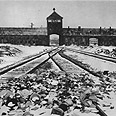
Auschwitz concentration camp. Wheels of justice in Germany grind slowly
Photo: EPA
The news that Germany's legal authorities have decided to try to prosecute
about 50 SS men who served as guards in Auschwitz reached me in Poland ahead of the March of the Living.
In fact, for some 60 years, Germany's legal authorities failed to take action against criminals from the Third Reich era – and if they did, in most cases the punishments were quite absurd.
There is no doubt that the wheels of justice in Germany grind slowly, but it is very unclear whether they grind with certainty. Because if those SS veterans are indeed prosecuted, due to their old age only few of them will survive until the end of the trial.
Remembrance
82-year-old Shlomo Ronen wants to utilize time he has left to relay what he endured during WWII, feels adolescents apathetic. 'Holocaust must be studied just like the Bible is studied. It must be passed down from father to son for thousands of years,' he says
Still, it should be said that it's better late than never. The important point in the current decision is not punishing those old men, but the principle. In other words, the new Germany is finally admitting that for decades it was wrong in showing great and even criminal forgiveness toward many of the executors of the Holocaust acts.
Today's Germany is in fact expressing remorse over that negligence, that attempt to sweep the oh-so-ugly past of its previous generations under the carpet. And that's all for the best too.
In the meantime, in Poland, neither the heavy snow falling in the past few days nor the intense cold have disrupted the arrival of thousands of participants to the March of the Living. In spite of the difficult weather conditions, which are unusual for the month of April even in this Eastern European country, the directors and activists of this complex and complicated plan of handling 11,000 people – young and old arriving from nearly 50 countries – have managed to overcome the difficulties.
In the 25 years in which the symbolic march from Auschwitz to Birkenau has been held, close to 200,000 Jews and non-Jews have participated in it. In those 25 years, in which I am also among the marchers, I am repeatedly amazed by the almost perfect implementation of such a complex and diverse program. A program which requires unusual planning and logistics in order to supply the required conditions for more than 10,000 visitors – from transportation and kosher food to accommodation.
This huge, impossible mission is orchestrated by Aharon Tamir, the deputy chairman and CEO of the march, with a team of dedicated and efficient activists, most of whom – including doctors and paramedics – are volunteers.
All the participants left for Krakow on Saturday evening and Sunday, in order to be ready for Monday's march.
Noah Klieger is Yedioth Ahronoth's correspondent at the March of the Living















